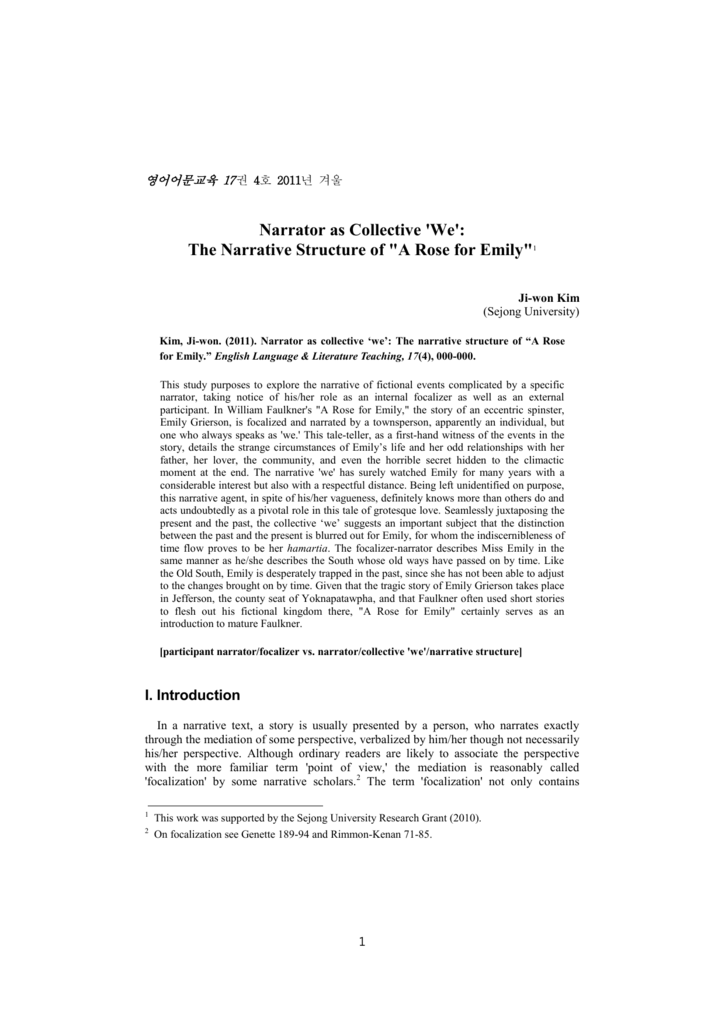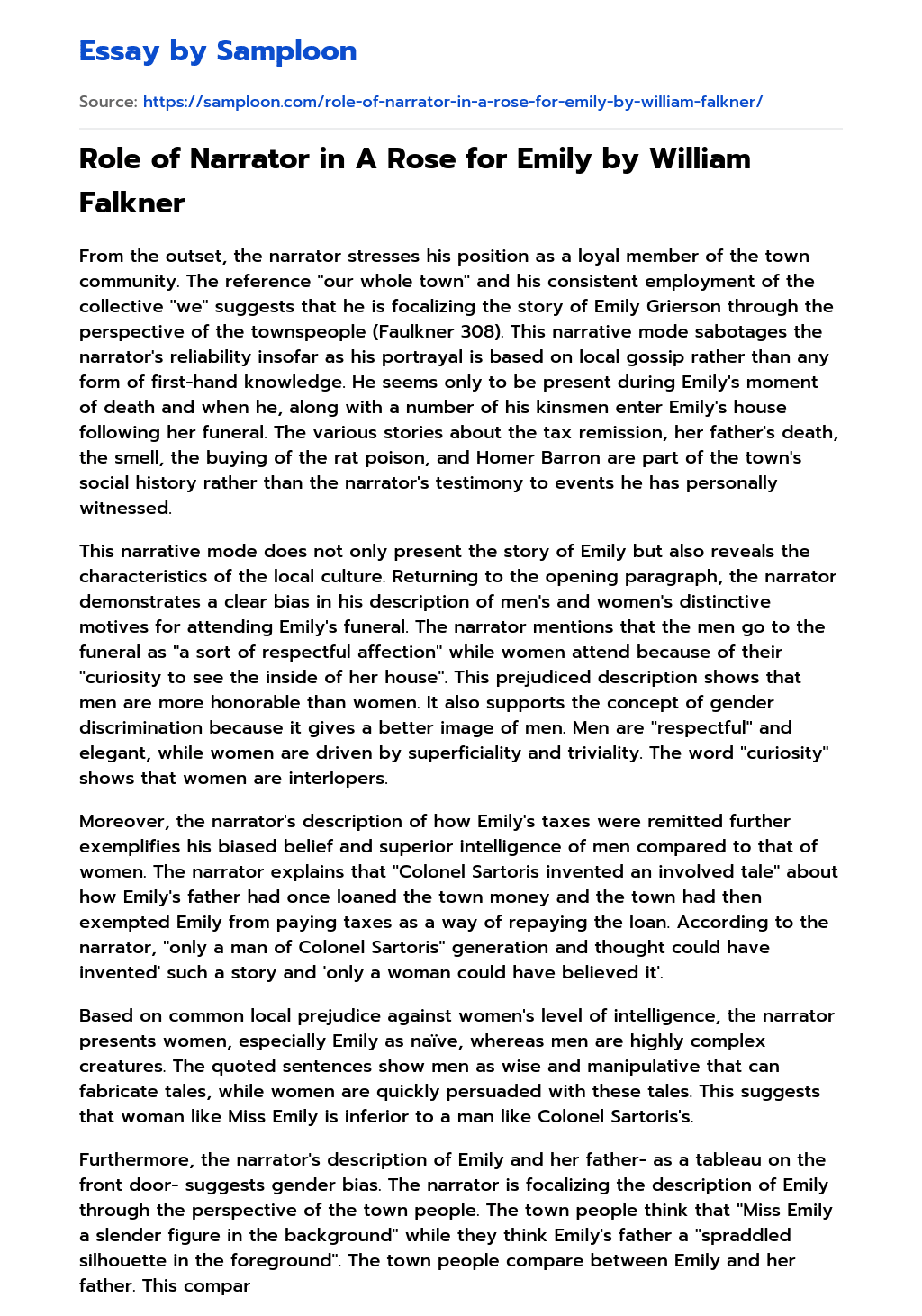Who Is The Narrator For A Rose For Emily - ‘a rose for emily’ is william faulkner’s most widely studied short story, and its distinctive narrative voice is one reason for the story’s. The narrator makes judgments both for and. The narrator in a rose for emily is considered unreliable because they represent the town's collective perspective, which is based. Who is the narrator, can she or he read minds, and, more importantly, can we trust her or him? Who, then, is this narrator, who seemingly speaks for the town but simultaneously draws back from it? The narrator deepens the mystery of who they are and how much they know at the end of the story, when the townspeople discover homer’s body. First person (peripheral narrator) the fascinating.
First person (peripheral narrator) the fascinating. Who, then, is this narrator, who seemingly speaks for the town but simultaneously draws back from it? The narrator makes judgments both for and. Who is the narrator, can she or he read minds, and, more importantly, can we trust her or him? The narrator in a rose for emily is considered unreliable because they represent the town's collective perspective, which is based. The narrator deepens the mystery of who they are and how much they know at the end of the story, when the townspeople discover homer’s body. ‘a rose for emily’ is william faulkner’s most widely studied short story, and its distinctive narrative voice is one reason for the story’s.
The narrator in a rose for emily is considered unreliable because they represent the town's collective perspective, which is based. Who is the narrator, can she or he read minds, and, more importantly, can we trust her or him? Who, then, is this narrator, who seemingly speaks for the town but simultaneously draws back from it? First person (peripheral narrator) the fascinating. The narrator deepens the mystery of who they are and how much they know at the end of the story, when the townspeople discover homer’s body. ‘a rose for emily’ is william faulkner’s most widely studied short story, and its distinctive narrative voice is one reason for the story’s. The narrator makes judgments both for and.
A Rose for Emily by William Faulkner Plot Summary YouTube
First person (peripheral narrator) the fascinating. Who is the narrator, can she or he read minds, and, more importantly, can we trust her or him? The narrator makes judgments both for and. ‘a rose for emily’ is william faulkner’s most widely studied short story, and its distinctive narrative voice is one reason for the story’s. The narrator in a rose.
A Rose for Emily (1983)
Who, then, is this narrator, who seemingly speaks for the town but simultaneously draws back from it? The narrator makes judgments both for and. ‘a rose for emily’ is william faulkner’s most widely studied short story, and its distinctive narrative voice is one reason for the story’s. The narrator deepens the mystery of who they are and how much they.
Analysis of "A Rose For Emily" by William Faulkner Owlcation
Who, then, is this narrator, who seemingly speaks for the town but simultaneously draws back from it? The narrator deepens the mystery of who they are and how much they know at the end of the story, when the townspeople discover homer’s body. The narrator in a rose for emily is considered unreliable because they represent the town's collective perspective,.
The Narrative Structure of "A Rose for Emily"
First person (peripheral narrator) the fascinating. The narrator makes judgments both for and. Who, then, is this narrator, who seemingly speaks for the town but simultaneously draws back from it? ‘a rose for emily’ is william faulkner’s most widely studied short story, and its distinctive narrative voice is one reason for the story’s. The narrator in a rose for emily.
William Faulkner A Rose for Emily
The narrator deepens the mystery of who they are and how much they know at the end of the story, when the townspeople discover homer’s body. The narrator in a rose for emily is considered unreliable because they represent the town's collective perspective, which is based. The narrator makes judgments both for and. Who, then, is this narrator, who seemingly.
Once upon a time... Significance of time in "A Rose for Emily"
Who, then, is this narrator, who seemingly speaks for the town but simultaneously draws back from it? Who is the narrator, can she or he read minds, and, more importantly, can we trust her or him? First person (peripheral narrator) the fascinating. ‘a rose for emily’ is william faulkner’s most widely studied short story, and its distinctive narrative voice is.
A Rose For Emily by William Faulkner The Narrator 1003 Words NerdySeal
The narrator makes judgments both for and. The narrator in a rose for emily is considered unreliable because they represent the town's collective perspective, which is based. ‘a rose for emily’ is william faulkner’s most widely studied short story, and its distinctive narrative voice is one reason for the story’s. Who, then, is this narrator, who seemingly speaks for the.
A Rose for Emily (1983) — The Movie Database (TMDB)
Who is the narrator, can she or he read minds, and, more importantly, can we trust her or him? The narrator deepens the mystery of who they are and how much they know at the end of the story, when the townspeople discover homer’s body. First person (peripheral narrator) the fascinating. The narrator in a rose for emily is considered.
A Rose For Emily by William Faulkner The Narrator 1003 Words NerdySeal
Who is the narrator, can she or he read minds, and, more importantly, can we trust her or him? Who, then, is this narrator, who seemingly speaks for the town but simultaneously draws back from it? First person (peripheral narrator) the fascinating. ‘a rose for emily’ is william faulkner’s most widely studied short story, and its distinctive narrative voice is.
≫ Role of Narrator in A Rose for Emily by William Falkner Free Essay
The narrator deepens the mystery of who they are and how much they know at the end of the story, when the townspeople discover homer’s body. The narrator makes judgments both for and. The narrator in a rose for emily is considered unreliable because they represent the town's collective perspective, which is based. ‘a rose for emily’ is william faulkner’s.
The Narrator Deepens The Mystery Of Who They Are And How Much They Know At The End Of The Story, When The Townspeople Discover Homer’s Body.
The narrator makes judgments both for and. The narrator in a rose for emily is considered unreliable because they represent the town's collective perspective, which is based. ‘a rose for emily’ is william faulkner’s most widely studied short story, and its distinctive narrative voice is one reason for the story’s. Who is the narrator, can she or he read minds, and, more importantly, can we trust her or him?
Who, Then, Is This Narrator, Who Seemingly Speaks For The Town But Simultaneously Draws Back From It?
First person (peripheral narrator) the fascinating.









